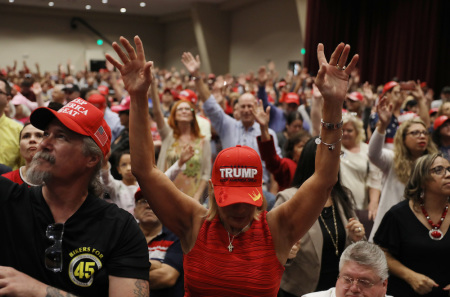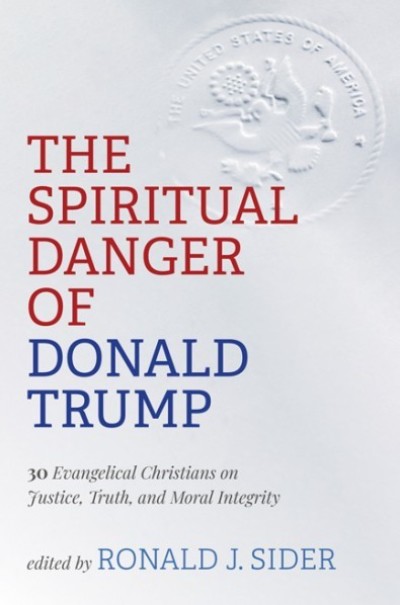'The Spiritual Danger of Trump:' New book asks evangelicals to rethink their vote in 2020

A new book consisting of essays by 30 evangelical Christians of different political and professional stripes is calling on white evangelicals to rethink their support for President Donald Trump in 2020 and warns the president is damaging the broader culture’s perception of evangelical Christianity.
The new book, The Spiritual Danger of Donald Trump: 30 Evangelical Christians on Justice, Truth, and Moral Integrity, was released last Monday by Wipf and Stock Publishers.
“Our plea is to white evangelicals to please take another look and ask, ‘Does this person measure up to biblical norms?’” Ron Sider, founder of Evangelicals for Social Action, told The Christian Post. “We are not telling you what to include. But please prayerfully think about that. Even if you think the book will make you mad, given the title, I challenge you to read it and decide for yourself if there are any valid points that we are making there.”

Sider, who edited the book, is a longtime evangelical figure and an advocate for biblical solutions to social and economic injustices. He has published over 40 books, including Rich Christians in an Age of Hunger.
Sider said that his call is for white evangelicals to evaluate evangelicalism’s “biblically balanced” agenda before they vote in 2020.
Exit polls from 2016 showed that about eight-in-10 self-identified white evangelicals or born-again Christians voted for the Republican candidate, Trump, in the 2016 election, while just 16% voted for Democratic candidate Hillary Clinton.
Sider said that evangelicals wondering what exactly a biblically balanced agenda is can turn to the public policy priorities of the National Association of Evangelicals, which he says calls for evangelical civil engagement to have a “biblically balanced agenda.”
“The book is not a book to tell people how to vote,” Sider stressed. “It is a book to call people to think biblically about this election and about the character of candidates.”
The book features commentary from Republicans, Democrats and Independents who work in a wide range of sectors: from university professors and theologians to a former congressman and a former CIA analyst.
“We’re not just left-wing Democrats,” Sider said. “We are a whole range of views begging American white evangelicals to ask this simple question: ‘Does Donald Trump’s behavior and policies fit with or contradict biblical norms?’”
Contributors include Baylor University Professor George Yancey, former Republican Congressman Reid Ribble, conservative speaker and author Vicki Courtney as well as scholars like the Ethics & Public Policy Center’s Pete Wehner and John Fea of Messiah College in Pennsylvania, both of whom have regularly expressed their displeasure with the president in the media.
In their chapters, the contributors write about different areas of concern they have with the actions, policies or behaviors of the president.
Topics include Trump’s instances of dishonesty, his past adulterous behaviors, his attacks on the media, the president’s past controversial statements on women, policies restricting immigration and refugee resettlement as well as his administration’s policies to restrict welfare benefits, among other topics.
“One of the most common biblical themes is God’s special concern for the poor. But that doesn’t seem to be a significant part of his policy,” argued Sider, who also serves as distinguished professor emeritus of theology, holistic ministry and public policy at Palmer Theological Seminary at Eastern University in Pennsylvania.
For many conservative Christians, they voted for Trump as a “lesser of two evils” in 2016. During the 2016 campaign, Trump made a concerted effort to appeal to conservative evangelicals’ concerns about the issues of abortion and religious freedom. His administration has done much to follow through with those campaign promises.
However, Sider warns that evangelicals should not be single-issue or dual-issue voters.
“I’ve always said I think those are very important issues. But if we are going to be biblical in our politics, we need to go back and ask: ‘What is it that God cares about?’” Sider said. “God cares about the sanctity of human life and justice for the poor. God cares about marriage and racial justice. God cares about sexual integrity and cares for creation and peacemaking and freedom. It is simply fundamentally mistaken to think that one issue overrides all others.”
In his chapter, Yancey, a Baylor professor of sociology, admits that Trump spoke to the needs of conservative evangelicals in 2016 that were not being addressed by other politicians. They were concerns and fears that he, as an evangelical, shared.
Yancey, an African American, said there is credible fear that the radical political left has become hostile toward traditionally Christian views on issues like marriage and sexuality. Trump vowed to protect religious freedom at a time when many conservative Christians perceived their rights to uphold their beliefs to be dwindling in the face of secular culture and politicians.
“I want to say to my Christian friends, especially the evangelical ones who most support Trump: I hear you. Christianophobia is real,” Yancey wrote. “I have studied and debated it with those who do not believe it exists. Trump has promised to protect Christians. The seeking of political control is one way to try to deal with Christianophobia. But it is the wrong way.”
Yancey contended that Trump “can’t fix what troubles Christians” because he can only offer a political solution while the issue is “cultural.”
“What Trump can do is make the situation worse by turning culture against us further,” he wrote.
He warned that if Christians do not “push back on the disturbing attributes of Trump, then we will own those attributes.”
“For example, if enough Christians accept the perceptions of this leader … then our faith will become known for not caring about the race-baiting statements of our president,” Yancey contended. “This will translate into Christians not caring about racism and people of color. The argument that we must vote for Trump as the less bad option will not save us from being labeled racist if we do not challenge Trump’s race-baiting.”
Yancey drew a comparison to how conservative Christians view Christians who support the Democratic Party.
“Many conservative Christians accuse Democratic Christians of endorsing abortion because they vote for pro-choice candidates,” he stated. “If those Christians stay silent on this issue, then they have a point. But if Democratic Christians vote for Democrats despite and make it plain they opposed that plank of their political party, then they do not own the pro-choice label.”
Courtney, a conservative southern woman and award-winning author who speaks at women’s conferences, challenged evangelical Christians, even those who vote for Trump, to speak out when the president does something that doesn’t meet the biblical standard.
“You cannot stand for moral decency and express outrage over the objectification of women if you are willing to give Trump a free pass,” she wrote. “No one will respect your opinion.
“I recently watched an example of this play out on Twitter in the aftermath of the 2020 Super Bowl halftime show. Franklin Graham tweeted concern that Shakira and J.Lo’s performance was ‘showing young girls that sexual exploration of women is okay.’ I share much of Graham’s sentiment, but many were quick to call him out on a double standard.”
She said some social media users responded to Graham with pull quotes from Trump’s past comments on women.
“The Franklin Graham Twitter exchange perfectly illustrates the larger-scale problem Christians face if they choose to ignore, minimize or make excuses for Trump’s misogyny (and other immoral offenses),” she wrote. “No one will take Christianity seriously if we shout about the moral injustices of past presidents but are struck dumb when it comes to the moral injustices of the current one.”
Sider fears that the “broader culture is developing a negative view of Christianity.”
“Because of the close identity of white evangelicals and the behavior and actions of Donald Trump, I am worried about the long-term effect on the culture’s attitude toward Christianity as a result of the failure of white evangelicals to say, ‘That’s not acceptable,’” he said.
Follow Samuel Smith on Twitter: @IamSamSmith
or Facebook: SamuelSmithCP





















